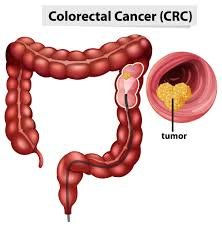Colon cancer
Colon cancer, also known as colorectal cancer, is a type of cancer that begins in the colon (large intestine) or the rectum. It is one of the most common types of cancer worldwide. The colon and rectum are part of the digestive system, responsible for processing food and eliminating waste.
Causes and Risk Factors:
The exact cause of colon cancer is not always clear, but it often develops from small growths called polyps that form on the inner lining of the colon or rectum. Some of these polyps can become cancerous over time. Several factors can increase the risk of developing colon cancer, including:
Age:
The risk of colon cancer increases with age, typically affecting people over the age of 50.
Family History:
Having a family history of colon cancer or certain genetic conditions, such as Lynch syndrome or familial adenomatous polyposis (FAP), can increase the risk.
Personal History:
Individuals who have had colon cancer in the past are at a higher risk of developing it again.
Diet:
A diet high in red and processed meats and low in fiber can increase the risk.
Physical Inactivity:
Lack of physical activity has been associated with an increased risk of colon cancer.
Obesity:
Being overweight or obese is a risk factor for colon cancer.
Smoking and Alcohol:
Smoking and excessive alcohol consumption have been linked to an increased risk.
Inflammatory Bowel Disease (IBD):
Long-term conditions such as ulcerative colitis or Crohn's disease can increase the risk.
Symptoms: In the early stages, colon cancer may not cause noticeable symptoms. However, as the cancer advances, symptoms may include:
Persistent changes in bowel habits, such as diarrhea, constipation, or a change in stool consistency.
Rectal bleeding or blood in the stool.
Abdominal discomfort, cramps, or pain.
Unexplained weight loss.
Fatigue or weakness.
A feeling that the bowel does not empty completely.
Iron deficiency anemia (low red blood cell count).
Treatment:
The treatment for colon cancer depends on the stage of cancer, the patient's overall health, and other individual factors. Common treatment options include:
Surgery:
The main treatment for colon cancer involves surgically removing the cancerous tumor and nearby affected tissues. In some cases, a colostomy may be necessary, which involves creating an opening in the abdominal wall for waste elimination.
Chemotherapy:
It involves the use of drugs to kill cancer cells or stop their growth. It can be used before surgery (neoadjuvant), after surgery (adjuvant), or to treat advanced cancer.
Radiation Therapy:
This treatment uses high-energy rays to kill cancer cells or shrink tumors. It is sometimes used in combination with surgery or chemotherapy.
Targeted Therapy:
These drugs target specific molecules involved in cancer growth to inhibit its progression. Targeted therapies are often used in combination with chemotherapy for advanced-stage colon cancer.
Immunotherapy:
This approach harnesses the body's immune system to recognize and attack cancer cells. Immunotherapy may be used in some cases, especially for advanced colon cancer that has specific genetic features.
The prognosis for colon cancer varies depending on the stage at diagnosis, overall health, and how well the cancer responds to treatment. Early detection through regular screenings can significantly improve the chances of successful treatment and long-term survival. If you have concerns about colon cancer or notice any symptoms, it's essential to consult a healthcare professional for evaluation and appropriate care.
